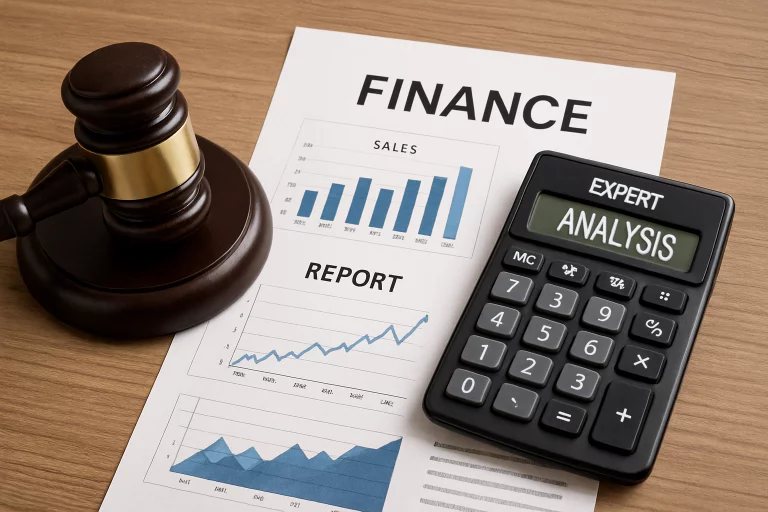Introduction
Commercial litigation is rarely straightforward, and the complexity of these cases continues to grow as businesses and financial transactions become more sophisticated. Disputes often involve substantial volumes of financial data, from balance sheets and profit-and-loss statements to cash flow analyses and market forecasts. Untangling these intertwined financial matters and establishing clarity requires a specialized skill set. In such circumstances, the involvement of a financial expert witness becomes advantageous and often indispensable. These professionals play a pivotal role in translating dense, often bewildering financial evidence into clear, actionable insights for judges, juries, and attorneys, ensuring that every party understands the monetary implications at stake.
Key Responsibilities of Financial Expert Witnesses
The contributions of a financial expert witness in commercial disputes are multi-faceted and require a blend of analytical prowess and clear communication. At the core, financial expert witnesses are charged with dissecting complex data, drawing insights, and communicating those findings in a neutral and compelling way. Their key responsibilities often include the following:
- Objective Assessments: Most of the expert’s role revolves around providing impartial, unbiased evaluations of financial statements, transactional records, contracts, and other documentation. They go beyond basic number-crunching, ensuring that each assertion or finding is rooted in verifiable data and is free from personal or client-driven bias.
- Damage Calculations: In disputes where financial losses—such as lost profits from a breach of contract, diminished business value, or costs arising from business interruption—are at the forefront, financial experts meticulously quantify damages. Calculations must consider industry norms, historical performance, market trends, and relevant case law, all while surviving rigorous cross-examination.
- Forensic Analysis: In cases involving suspected financial wrongdoing or fraud, a financial expert’s responsibilities extend into forensic accounting. Here, they trace funds, identify patterns of irregular transactions, verify the authenticity of financial representations, and uncover discrepancies or evidence of asset concealment that may have a direct bearing on the litigation.
- Valuation of Assets: Another critical area is the valuation of tangible and intangible assets. Expert witnesses employ established valuation methodologies to assess the fair market value of businesses, ownership interests, intellectual property, or other assets that are subject to dispute, often drawing upon both historical data and forward-looking analyses.

Qualifications and Expertise
Financial expert witnesses’ effectiveness and credibility are largely attributed to their qualifications and experience. Reputable professionals often hold advanced certifications, such as Certified Public Accountants or Chartered Financial Analysts, and have extensive real-world experience in financial analysis, forensic accounting, corporate finance, or business valuation. However, their ability to communicate complex analyses effectively and persuasively under courtroom scrutiny is also crucial.
Impact on Legal Outcomes
Financial expert witnesses significantly impact commercial litigation outcomes, setting parameters for damage calculations, settlements, and final judgments. Their testimony is the intellectual backbone for claims or defenses, providing objective evidence to substantiate allegations or rebut opposing viewpoints. Their technical expertise, objectivity, and strategic insight can shape the trajectory and resolution of commercial disputes.
Challenges Faced by Financial Expert Witnesses
While the advantages of engaging a financial expert witness are substantial, these professionals also face unique and sometimes daunting challenges throughout the litigation lifecycle:
- Maintaining Objectivity: While experts are typically retained by one party, credibility is contingent upon strict impartiality. Ensuring that findings are defensible, unbiased, and able to withstand judicial scrutiny is a constant concern. Should an expert show even a hint of advocacy, their value and testimony can be severely compromised.
- Complex Data Interpretation: The volume and complexity of financial documents in commercial litigation are often staggering. Sifting through hundreds or thousands of pages, identifying key transactions, and synthesizing the data requires diligence and methodical analytical processes. A single oversight or misinterpretation can undermine an entire case.
- Effective Communication: Perhaps the most critical skill is explaining sophisticated financial models, valuation techniques, or damage calculations to a judge or jury unfamiliar with financial concepts. The expert must make abstract numbers and analytical frameworks concrete and understandable, ensuring that the significance of their findings is accessible to all.
Best Practices for Engaging Financial Expert Witnesses
Early involvement of a financial expert witness enhances their contribution to a case. Clear communication is crucial, ensuring alignment and shared objectives. Comprehensive documentation is essential for thorough analysis. Structured preparation, including mock direct and cross-examinations, enhances an expert’s readiness and composure. Experience on the witness stand is invaluable, but a well-prepared expert can provide valuable insights.
Conclusion
As the landscape of commercial litigation becomes increasingly intricate, the necessity of involving a financial expert witness is more pronounced than ever. Their specialized expertise, adept analytical abilities, and effective communication skills bridge the gap between complex financial realities and judicial understanding. Financial expert witnesses uphold transparency and fairness by providing courts with objective, methodologically sound analyses, often tipping the scales toward well-informed and equitable outcomes.

